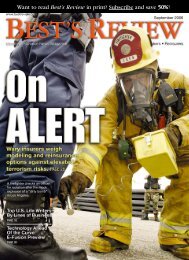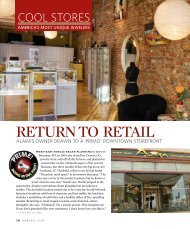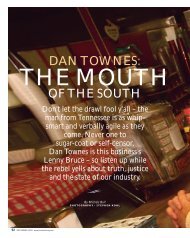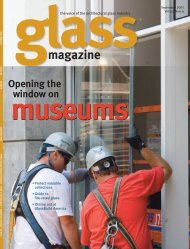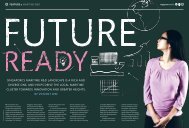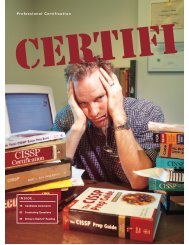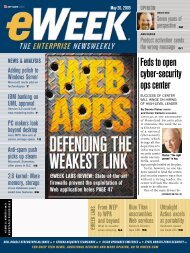42-49 F-Coping w Millennials.indd - tabpi
42-49 F-Coping w Millennials.indd - tabpi
42-49 F-Coping w Millennials.indd - tabpi
Create successful ePaper yourself
Turn your PDF publications into a flip-book with our unique Google optimized e-Paper software.
<strong>Coping</strong> with<br />
Millennıals<br />
on<br />
Campus<br />
The majority of today’s college students are<br />
from the Millennial Generation, which has distinct<br />
traits that define its strengths and weaknesses.<br />
To successfully teach these students, business<br />
schools must understand what <strong>Millennials</strong><br />
expect and how they learn.<br />
Neil BRennan<br />
<strong>42</strong> July/August 2011 BizEd
By Steve Williams, Jim Beard and Margaret Tanner<br />
The five 19-year-old sophomores seemed dejected, yet defiant, as<br />
they waited for their business professor’s critique.<br />
“Your work on the case study project was good, and your team<br />
presentation was solid,” the professor began. “But I’m concerned<br />
about your post-project team member evaluations. You were<br />
instructed to complete the evaluations individually. I stressed the importance of<br />
confidentiality and absolute candor in assessing each team member’s individual<br />
contributions. Otherwise, the evaluation process loses validity and reliability.<br />
Yet, each of you ended up with a 95 percent evaluation from all the others.<br />
Doesn’t that seem like an incredible coincidence to you?”<br />
BizEd July/August 2011<br />
43
One of the students answered<br />
without reservation. “It’s not a coincidence.<br />
We met together and worked<br />
out the distribution of scores. Seemed<br />
like the only fair way to do it.”<br />
“But my instructions were<br />
clear, right? You just decided to<br />
ignore them.”<br />
Another student chimed in. “Your<br />
instructions weren’t consistent with<br />
everything else you’ve taught us<br />
about teamwork, like the value of<br />
collaboration. Suddenly, at the end<br />
of the semester, we’re supposed to<br />
secretly rat each other out. It’s like<br />
you want us to pick a weak link to<br />
get a lower individual grade.”<br />
Exasperated, the professor<br />
responded, “Collaboration occurs<br />
when you work together to solve<br />
problems and make decisions by<br />
combining your skills and perspectives.<br />
It’s a primary value of teamwork,<br />
yes. Collusion is when you<br />
get together to fix an outcome that<br />
benefits each of the colluders. That’s<br />
often illegal. You can tell the difference<br />
between collaboration and collusion,<br />
right?”<br />
The young students looked at<br />
each other, puzzled. Then, with total,<br />
wide-eyed innocence, they replied in<br />
unison, “No.”<br />
Something is different about this<br />
generation, the professor thought.<br />
These are the same young people<br />
who worked so hard and so brilliantly<br />
on the case study project…in<br />
business ethics!<br />
Children born since 1982<br />
are collectively known as<br />
the Millennial Generation,<br />
and they’ve been<br />
descending on college campuses for<br />
the past ten years. Raised by protective<br />
Baby Boomer and Generation<br />
X parents, these <strong>Millennials</strong> have<br />
common identifiable characteristics<br />
that can make them challenging to<br />
educate. But faculty and administrators<br />
who understand the generational<br />
profile of these students can<br />
create campus and classroom environments<br />
that will appeal to them,<br />
nurture them—and prepare them<br />
for the real world.<br />
Neil Howe and William Strauss<br />
identified seven core personality<br />
traits of this generation in two books<br />
published in 2000 and 2007, <strong>Millennials</strong><br />
Rising: The Next Great Generation<br />
and <strong>Millennials</strong> Go to College:<br />
Strategies for A New Generation on<br />
Campus. At the College of Business<br />
at the University of Arkansas–Fort<br />
Smith, we have used this framework<br />
to help us develop initiatives that<br />
suit students with these profiles and<br />
make it easier for them to learn.<br />
The Seven (Deadly) Traits<br />
According to Howe and Strauss,<br />
Millennial students are special,<br />
sheltered, confident, team-oriented,<br />
achieving, pressured, and conventional.<br />
Each trait affects how they<br />
see themselves—and how they<br />
behave in the classroom.<br />
Special. Overprotective Boomer<br />
and Generation X parents have<br />
become known as Helicopter Parents,<br />
who hover anxiously over<br />
their children, assuring them that<br />
they are all winners. As a result,<br />
many of these young adults want to<br />
be recognized just for showing up<br />
and trying, and they’re indignant or<br />
upset when that’s not good enough<br />
at the university level.<br />
Sheltered. Coddled since birth by<br />
their parents, who constantly fear<br />
for their safety, <strong>Millennials</strong> have<br />
been distanced from the “school of<br />
hard knocks.” As a result, many<br />
are unprepared for the realities of<br />
Dean Steve Williams serves hot dogs<br />
to business students at the 2010<br />
annual Dogs with the Dean student<br />
appreciation event.<br />
the college classroom. Many do not<br />
hesitate to challenge their professors<br />
when they do receive constructive<br />
criticism or don’t receive A grades.<br />
Confident. Having been told by<br />
their parents that they can be whatever<br />
they want to be, <strong>Millennials</strong><br />
possess high levels of trust and optimism.<br />
Faculty sometimes interpret<br />
their self-assurance as arrogance, a<br />
sense of entitlement, and an unrealistic<br />
belief that they can accomplish<br />
too much too soon.<br />
Team-oriented. <strong>Millennials</strong> have<br />
strong team instincts and tight peer<br />
bonds; they rely on e-mail, texting,<br />
and social media like Facebook,<br />
Twitter, and YouTube to stay in<br />
constant touch with friends and<br />
family. They expect a business<br />
classroom to offer team-based<br />
opportunities and address ways to<br />
serve the public good.<br />
Achieving. <strong>Millennials</strong> are on<br />
track to become the best-educated<br />
and best-behaved adults in history.<br />
But since many of them have never<br />
worked outside the home, they frequently<br />
lack business etiquette and<br />
social skills. Business schools can<br />
expect an influx of students who<br />
44 July/August 2011 BizEd
need help developing professional<br />
and career capabilities.<br />
Pressured. Since their supportive<br />
parents have pushed them to study<br />
hard, avoid personal risks, and<br />
take full advantage of every opportunity,<br />
<strong>Millennials</strong> feel pressured to<br />
excel. They actively seek reactions<br />
and are lost without constant feedback,<br />
and the drive to succeed can<br />
cause them to cheat, plagiarize, and<br />
whine in the classroom.<br />
Conventional. More comfortable<br />
with their parents’ values than<br />
any previous generation, <strong>Millennials</strong><br />
have a high level of respect for<br />
teachers and institutions. However,<br />
this respect comes with an equally<br />
high level of expectation. If business<br />
schools fail to live up to Millennial<br />
expectations, students can lose faith<br />
and walk away. At the same time,<br />
that conventionality leads <strong>Millennials</strong><br />
to be less creative and take fewer<br />
risks in the classroom.<br />
These seven characteristics can<br />
make <strong>Millennials</strong> challenging to<br />
teach, unless faculty learn to cope<br />
with the traits instead of trying to<br />
overcome them. At the UA Fort<br />
Smith College of Business, our professors<br />
are working on ways to do<br />
just that.<br />
Making Them Feel Special<br />
Business schools can capitalize on<br />
the <strong>Millennials</strong>’ need to feel special<br />
by establishing new traditions, promoting<br />
high standards, involving<br />
Helicopter Parents in campus activities,<br />
and supplying the great service<br />
students and parents demand.<br />
Establishing new traditions. At<br />
the College of Business, we’ve developed<br />
events like “Dogs with the<br />
Dean,” a student-recognition activity<br />
held every fall semester. During these<br />
gatherings, faculty and administrators<br />
serve hot dogs, chips, cookies,<br />
and drinks to business students at<br />
lunch on one day and at dinner the<br />
following day. Members of the Student<br />
Leadership Council also serve<br />
freshly baked cookies to grateful<br />
students multiple times throughout<br />
every semester on Student Appreciation<br />
Days. Both of these inexpensive<br />
traditions are widely anticipated and<br />
well-attended by business students<br />
and faculty alike.<br />
The Student Leadership Council<br />
serves cookies to <strong>Millennials</strong><br />
on Student Appreciation Days.<br />
These events also give students<br />
a chance to provide feedback<br />
and suggestions to the school.<br />
Promoting high standards. The<br />
College of Business has the highest<br />
grade point average admission<br />
requirement of any program at the<br />
university, so students need higher<br />
academic credentials to matriculate<br />
into the school. We make sure potential<br />
business students know this, so<br />
they realize they have achieved something<br />
difficult if they’re admitted.<br />
Involving parents. The College<br />
of Business is following the lead of<br />
other academic institutions, such as<br />
Slippery Rock University, to develop<br />
and share best practices. These<br />
include providing copies of policies<br />
and resources to parents; posting<br />
appropriate information on the business<br />
school Web site; and disseminating<br />
information about curriculum<br />
requirements, grading policies, financial<br />
aid opportunities, and safety<br />
and security services. Additionally,<br />
we educate parents about the Family<br />
Educational Rights and Privacy Act<br />
(FERPA) regulations, which restrict<br />
the information we can lawfully<br />
share without student consent. As<br />
much as we can, we solicit parents to<br />
be champions who work on resolving<br />
concerns, rather than obstacles<br />
we must overcome.<br />
Providing great service. We have<br />
created the staff position of Student<br />
Services Coordinator, whose<br />
job is to advise and retain business<br />
school students. <strong>Millennials</strong> expect<br />
service people to be available 24/7<br />
and answer all queries immediately.<br />
Our coordinator doesn’t meet<br />
those requirements, but is available<br />
during regular hours of operation<br />
to answer student questions and<br />
concerns. The coordinator also is<br />
supported by trained student peer<br />
advisors. And to provide students<br />
with some form of round-the-clock<br />
service, the College of Business has<br />
BizEd July/August 2011<br />
45
eformatted its Web site to contain<br />
links with the answers to students’<br />
frequently asked questions.<br />
As part of being “special,” <strong>Millennials</strong><br />
harbor the belief that they<br />
can request extraordinary service.<br />
This means they expect deans and<br />
faculty to be accessible to them at<br />
all times. At the College of Business,<br />
we make it abundantly clear when<br />
we will and will not be available. We<br />
also delineate the acceptable boundaries<br />
for prompt and consistent feedback,<br />
so they know when they can<br />
expect e-mail responses and when<br />
faculty will be available to personally<br />
respond to student queries. We want<br />
them to feel special—but we don’t<br />
want them to control the school.<br />
Providing Shelter<br />
Security is a top priority for <strong>Millennials</strong>,<br />
and business schools need<br />
to address it. Small schools can<br />
use their size as a selling point by<br />
emphasizing how a small campus<br />
offers a safer and more personal<br />
experience. Larger schools might<br />
point to their campus security force<br />
or integrated alarm systems. The<br />
point is to minimize any sense of<br />
risk for students and their parents.<br />
In the b-school classroom, <strong>Millennials</strong><br />
who have been sheltered<br />
from real-world expectations often<br />
will complain about what they<br />
perceive as unfair grades. These<br />
students, who have been raised to<br />
play it safe, also frequently display<br />
a lack of creativity, possess few<br />
analytical decision-making skills,<br />
and are averse to taking risks.<br />
At our school, to make them<br />
feel safe from surprises in the<br />
classroom, we’ve started to pre sent<br />
complete course information in<br />
all syllabi at the beginning of each<br />
semester. Policies related to faculty<br />
expectations, grading practices,<br />
and classroom conduct are spelled<br />
out in detail and covered in class to<br />
ensure business students are aware<br />
of the rules and requirements.<br />
Because many overprotected <strong>Millennials</strong><br />
have never held jobs, they<br />
lack professional and social skills,<br />
so we think it’s important to nurture<br />
student internship relations. Thus,<br />
we’ve created a faculty position for<br />
an Internship Coordinator, who<br />
works with the university’s career<br />
services department and the Dean’s<br />
Leadership Council of the business<br />
school. Since we implemented this<br />
program, business student internships<br />
have hit record numbers.<br />
In addition, we’ve implemented<br />
“<strong>Millennials</strong> respond better when they’re told about<br />
great things that will happen when they make<br />
appropriate decisions, rather than the terrible<br />
things that could result from incorrect choices.”<br />
Students work on business etiquette<br />
and social networking skills as they<br />
meet with Fort Smith business leaders.<br />
changes to our required business<br />
communications class. We<br />
also have developed required and<br />
voluntary modules that feature<br />
sessions on résumé building and<br />
review, business and dining etiquette,<br />
social networking, job<br />
training, and career management.<br />
Other modules offer students assistance<br />
in developing an “elevator<br />
speech” and opportunities to conduct<br />
mock interviews with corporate<br />
volunteers.<br />
Finally, we are looking into proposals<br />
that will help develop our students’<br />
leadership and civic engagement<br />
skills. We believe community<br />
engagement opportunities will build<br />
our students’ professional and social<br />
interaction skills while simultaneously<br />
capitalizing on their desire to<br />
be involved in not-for-profit and<br />
community-based activities.<br />
Playing to Their Confidence<br />
<strong>Millennials</strong> are used to having their<br />
self-confidence praised and shored<br />
up, so they tend to be receptive to<br />
comments and concepts that are<br />
relayed in positive tones.<br />
They respond better<br />
when they’re told about<br />
the great things that will<br />
happen when they make<br />
appropriate decisions,<br />
rather than the terrible<br />
things that could result<br />
from incorrect choices. In<br />
the classroom, their self-confidence<br />
frequently leads them to rationalize<br />
poor results and decide against seeking<br />
much-needed help from their<br />
business professors.<br />
Therefore, when our College of<br />
Business professors discuss poor<br />
performance with students, they<br />
intertwine criticism with compliments.<br />
They also establish early<br />
in the semester that hard work by<br />
46 July/August 2011 BizEd
itself won’t guarantee high grades,<br />
and they indicate the type of student<br />
effort that’s likely to lead to<br />
desired rewards. Also, where possible,<br />
professors demonstrate preferred<br />
outcomes by providing concrete<br />
examples of successful papers,<br />
exams, and assignments.<br />
Capitalizing on Team Spirit<br />
With teamwork emphasized from<br />
daycare throughout their secondary<br />
education, <strong>Millennials</strong> are accustomed<br />
to identifying themselves<br />
within networks of tight peer groups.<br />
They were weaned on organized<br />
activities and communications technology.<br />
Indeed, for this generation,<br />
connectivity is a self-defining value.<br />
Because of their team orientation,<br />
<strong>Millennials</strong> expect that in the<br />
business school classroom, they will<br />
work in—and be graded as—teams.<br />
Thus, our faculty provide options for<br />
group work both in and out of the<br />
classroom. We’ve noted that these<br />
students prefer to work in teams of<br />
five or fewer, and they work best<br />
when professors provide a clear<br />
structure for team management,<br />
including a fair mechanism for ejecting<br />
slackers.<br />
At the curricular level, we have<br />
redesigned our sophomore Business<br />
Communications course to reflect<br />
this team bias. Rather than using<br />
it to stress individual skills, such<br />
as writing procedural memoranda,<br />
we focus on four specific learning<br />
outcomes of effective team communication:<br />
setting meeting agendas,<br />
holding effective meetings, writing<br />
and distributing minutes of team<br />
proceedings, and performing effective<br />
team roles to make collaborative<br />
decisions.<br />
We also accommodate those<br />
team-style preferences throughout<br />
the curriculum by embracing<br />
collaborative and active learning<br />
pedagogies instead of lectures. For<br />
example, our business professors are<br />
experimenting with using free online<br />
polling software like Poll Everywhere<br />
(www.polleverywhere.com). This<br />
service allows students to send texts<br />
from their cell phones to provide<br />
instant graphical responses to material<br />
covered in class. It also taps into<br />
Millennial preferences for technology<br />
and desire for social interaction.<br />
Helping Them Achieve<br />
Ever since kindergarten, <strong>Millennials</strong><br />
have expected to work hard, earn<br />
good grades, and pursue extracurricular<br />
activities. Rising standardized<br />
test scores confirm that they<br />
are the smartest generation in recent<br />
memory, and indications are that<br />
the majority of <strong>Millennials</strong> intend<br />
to earn a college degree. These<br />
high achievers assume schools will<br />
offer them a complete spectrum of<br />
extracurricular activities and access<br />
to cutting-edge technology. They<br />
also come to the classroom expecting<br />
high academic standards, small<br />
classes, fair and transparent grading<br />
practices, and traditional values similar<br />
to the ones their parents espouse.<br />
However, <strong>Millennials</strong> have grown<br />
up constantly multitasking, which<br />
means they have difficulty focusing<br />
on priorities. As a result, they’re<br />
more likely to do several things<br />
simultaneously and poorly than do a<br />
single thing well.<br />
To teach this group of easily<br />
distracted high achievers, some of<br />
our College of Business faculty have<br />
successfully mimicked the structure<br />
of video games, in which actions<br />
are followed by consequences and<br />
there is a clear relationship between<br />
effort and reward. These professors<br />
provide students with multiple paths<br />
and opportunities to maintain and<br />
improve course grades. They also<br />
offer students incremental rewards<br />
and frequent feedback—through<br />
quizzes, exercises, reports, papers,<br />
The College of Business at UA Fort Smith has converted unused entryway<br />
areas into spaces where students can relax or study.<br />
BizEd July/August 2011<br />
47
Recap: Nine<br />
Things to Know<br />
and group activities—which seems<br />
to work better for <strong>Millennials</strong> than<br />
the traditional grading structure of a<br />
midterm and final.<br />
Alleviating Their Pressure<br />
Driven by their pushy Helicopter<br />
Parents and their own high expectations,<br />
today’s Millennial students<br />
experience unrelenting pressure to<br />
position themselves for long-term<br />
success. This pressure causes them<br />
to feel increased stress, engage in less<br />
physical activity, and give in to the<br />
temptation to cheat in the classroom.<br />
It also means they often want help<br />
developing the skills and habits that<br />
will enable them to transition into<br />
college life and then the working<br />
world. Business schools must address<br />
all of these situations.<br />
To alleviate stress and encourage<br />
physical activity, schools need<br />
to provide on-campus opportunities<br />
for extracurricular activities,<br />
such as intramural sports. In addition,<br />
schools need to set up student<br />
lounges where students can relax,<br />
step back, and socialize with their<br />
peers. At the College of Business,<br />
we have transformed unused areas<br />
into student lounges that have wireless<br />
access, electrical hookups for<br />
laptops and cell phones, and comfortable<br />
furniture where students<br />
can study or network.<br />
To discourage cheating, professors<br />
make sure that, early in the semester,<br />
they offer clear and concise discussions<br />
of what constitutes cheating,<br />
how to avoid it, and how it will be<br />
punished. Because plagiarism has<br />
become rampant, business faculty<br />
also have increased the amount of<br />
time they spend in class discussing<br />
what plagiarism is and how it will<br />
be monitored; almost all faculty are<br />
using copy-detecting software like<br />
The University of Arkansas–Fort<br />
Smith suggests these approaches<br />
for teaching the <strong>Millennials</strong> who<br />
form such a big part of this generation<br />
of college students.<br />
1. Develop campus traditions to<br />
build a sense of team spirit.<br />
2. Take opportunities early and<br />
often to explain issues such as<br />
academic integrity, intellectual<br />
ownership, and cheating.<br />
3. Provide clear expectations,<br />
detailed instructions, and<br />
explicit syllabi.<br />
4. Offer spaces for students to<br />
recover and rejuvenate.<br />
5. Help students develop skills<br />
in studying, time management,<br />
and professional development.<br />
6. Plan occasions for parental<br />
involvement and actually utilize<br />
input from parents.<br />
7. Offer career planning that<br />
stresses professionalism and<br />
long-term success.<br />
8. Provide internship opportunities<br />
and other forms of extracurricular<br />
engagement.<br />
9. Provide cutting-edge technology,<br />
interactive Web services,<br />
and social media access.<br />
turnitin.com to screen assignments.<br />
In fact, we are working on creating a<br />
unified approach to what many faculty<br />
believe is a plagiarism pandemic.<br />
One reason <strong>Millennials</strong> cheat<br />
is because they feel overworked,<br />
which also leads them to complain<br />
about course workload and grading<br />
practices. Our business professors<br />
address this problem by explaining<br />
to students the purpose of various<br />
assignments and what they need<br />
to do to achieve the grades they<br />
desire. Some business professors<br />
also are breaking assignments into<br />
more manageable modules and submodules,<br />
offering study guides that<br />
include exam questions, and developing<br />
more flexible deadlines—for<br />
example, reduced grades for late<br />
submissions rather than a “no late<br />
papers” policy.<br />
Finally, to help students learn coping<br />
techniques and transition into<br />
college life, faculty have developed a<br />
one-credit freshman course, Planning<br />
for Success, that teaches time- and<br />
stress-management skills. The course<br />
also helps prepare them for their<br />
subsequent business programs.<br />
Understanding Their<br />
Conventional Values<br />
Unlike previous generations, today’s<br />
<strong>Millennials</strong> are conventional; they<br />
believe social rules can help. They<br />
arrive on campus with a high level<br />
of respect for institutions, but they<br />
expect an equally high level of performance.<br />
When schools and faculty<br />
don’t meet expectations, they will see<br />
the trust of the <strong>Millennials</strong> erode.<br />
<strong>Millennials</strong> are accepting of<br />
the rules, but the rules need to be<br />
unmistakably defined, and the link<br />
between violations and consequences<br />
needs to be made clear. Business<br />
instructors have found that Millennial<br />
students tend to follow rules they<br />
understand, and they prefer structure<br />
in the classroom. With <strong>Millennials</strong>,<br />
we have learned to err on the side of<br />
providing “TMI” (too much information)<br />
about what is required in<br />
their role as students.<br />
For example, the College of Business<br />
Code of Ethics appears on every<br />
syllabus. Faculty members follow<br />
up by holding classroom discussions<br />
about what the code means<br />
in terms of everyday conduct: not<br />
cutting class, arriving on time, muting<br />
smartphones, not texting during<br />
class, and demonstrating respect in<br />
48 July/August 2011 BizEd
other ways for the instructor and<br />
their fellow students.<br />
At the same time, conventional<br />
<strong>Millennials</strong> are not risk takers.<br />
Professors find that it’s difficult to<br />
get them to demonstrate independence,<br />
creativity, and critical thinking.<br />
To address these concerns,<br />
more of our faculty members are<br />
experimenting with holding open<br />
classroom dialogues with students,<br />
rather than teaching through the<br />
traditional lecture format.<br />
The <strong>Millennials</strong> Go Forth<br />
Every generation develops its own<br />
personality and instantly identifiable<br />
markers. At institutions of<br />
higher learning, we must understand<br />
and adapt to the needs of<br />
each new set of students if we are<br />
to successfully prepare them for<br />
the working world.<br />
It’s true that some of their<br />
group traits make <strong>Millennials</strong><br />
seem unimaginative, whiney, unfocused,<br />
and self-centered. Much<br />
material has been written about<br />
the shocks that await them as they<br />
enter the corporate world and<br />
learn that they won’t be lauded<br />
simply for showing up and doing<br />
a standard level of work.<br />
But other books and articles<br />
have described how the corporate<br />
office will have to adjust<br />
to accommodate the <strong>Millennials</strong>—and<br />
why they will be such a<br />
strong addition to the workforce.<br />
This generation is loyal, hardworking,<br />
deeply concerned about<br />
social issues, and committed to<br />
making business a force for good.<br />
With the right kind of education,<br />
these students really can go out<br />
and change the world.<br />
Steve Williams is dean and Joel R. Stubblefield<br />
Endowed Chair of Business at the<br />
College of Business at the University of<br />
Arkansas in Fort Smith. Jim Beard is chair<br />
of the department of management and<br />
Margaret Tanner is chair of the accounting<br />
department at the College of Business.<br />
Ravi ShankaR<br />
Chief inveStment OffiCeR<br />
ePiC aSSet management Ltd.<br />
LOndOn<br />
DREXEL LEBOW MBA ’87<br />
THE DREXEL LEBOWMBA<br />
SingULaR eXPeRienCe<br />
COOPERATIVE WORLDVIEW<br />
“my drexel LeBow mBa was part of my quest to truly understand<br />
the global economy, so i could play my part.” LIVE IT. ®<br />
TheDrexelLeBowMBA.com<br />
BizEd July/August 2011<br />
<strong>49</strong>





